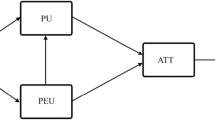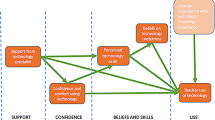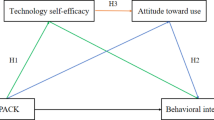Abstract
Pedagogical beliefs are a critical factor in terms of integrating technology into teaching, but very few technology acceptance models (TAMs) have considered them. Hence, this study aims to extend the TAM by incorporating pre-service teachers’ conception of teaching and learning. The revised model examined the influence of pre-service mathematics teachers’ constructivist and traditional pedagogical beliefs on their technology acceptance through perceived ease of use, perceived usefulness, attitude toward technology, and behavioral intention to use. Survey data were collected from 714 pre-service mathematics teachers in Turkey and analyzed through path analysis. The results showed that pre-service mathematics teachers’ pedagogical beliefs were more constructivist-oriented than traditional-oriented, and constructivist beliefs had a significant influence on the components of the TAM. On the other hand, pre-service teachers’ traditional-oriented beliefs did not influence their perceived usefulness of and attitudes toward technology but had positive effects on perceived ease of use. Implications for pre-service mathematics teacher education were discussed.

Similar content being viewed by others
References
Alburo, F. G. (2019). Mathematics teachers’ pedagogical beliefs and practices: Does being ‘conventional or constructivist matter?’ The Normal Lights, 13(1), 83–107.
Anderson, J. C., & Gerbing, D. W. (1988). Structural equation modeling in practice: A review and recommended two-step approach. Psychological Bulletin, 103, 411–423.
Anderson, S. E., Groulx, J. G., & Maninger, R. M. (2011). Relationships among preservice teachers’ technology-related abilities, beliefs, and intentions to use technology in their future classrooms. Journal of Educational Computing Research, 45(3), 321–338. https://doi.org/10.2190/EC.45.3.d
Aypay, A. (2011). The adaptation of the teaching-learning conceptions questionnaire and its relationships with epistemological beliefs. Educational Sciences: Theory & Practice, 11(1), 7–29.
Bagozzi, R. P. (2007). The legacy of the technology acceptance model and a proposal for a paradigm shift. Journal of the Association of Information Systems, 8(4), 244–254.
Bahcivan, E., Gurer, M. D., Yavuzalp, N., & Akayoglu, S. (2019). Investigating the relations among pre-service teachers’ teaching/learning beliefs and educational technology integration competencies: A structural equation modeling study. Journal of Science Education and Technology, 28, 579–588. https://doi.org/10.1007/s10857-021-09504-5
Ball, L., Drijvers, P., Ladel, S., Siller, H.-S., Tabach, M., & Vale, C. (Eds.). (2019). Uses of technology in primary and secondary mathematics education—tools, topics and trends. Springer.
Barak, M. (2014). Closing the gap between attitudes and perceptions about ICT-enhanced learning among pre-service STEM teachers. Journal of Science Education and Technology, 23, 1–14.
Birch, A., & Irvine, V. (2009). Preservice teachers’ acceptance of ICT integration in the classroom: Applying the UTAUT model. Educational Media International, 46(4), 295–315. https://doi.org/10.1080/09523980903387506
Bray, A., & Tangney, B. (2017). Technology usage in mathematics education research: A systematic review of recent trends. Computers & Education, 114, 255–273. https://doi.org/10.1016/j.compedu.2017.07.004
Bulut, O., & Cutumisu, M. (2018). When technology does not add up: ICT use negatively predicts mathematics and science achievement for Finnish and Turkish students in PISA 2012. Journal of Educational Multimedia and Hypermedia, 27(1), 25–42.
Cayton, C., Hollebrands, K., Okumuş, S., & Boehm, E. (2017). Pivotal teaching moments in technology-intensive secondary geometry classrooms. Journal of Mathematics Teacher Education, 20, 75–100. https://doi.org/10.1007/s10857-015-9314-y
Chan, K. W., & Elliott, R. G. (2004). Relational analysis of personal epistemology and conceptions about teaching and learning. Teaching and Teacher Education, 20, 817–831.
Chauhan, S. (2017). A meta-analysis of the impact of technology on learning effectiveness of elementary students. Computers & Education, 105, 14–30. https://doi.org/10.1016/j.compedu.2016.11.005
Cheung, A. C. K., & Slavin, R. E. (2013). The effectiveness of educational technology applications for enhancing mathematics achievement in K-12 classrooms: A meta-analysis. Educational Research Review, 9, 88–113.
Cohen, J. (1988). Statistical power analysis for the behavioral sciences (2nd ed.). Lawrence Erlbaum.
Davis, F. D. (1989). Perceived usefulness, perceived ease of use and user acceptance of information technology. MIS Quarterly, 13, 319–340.
Deng, F., Chai, C. S., Tsai, C. C., & Lee, M. H. (2014). The relationships among Chinese practicing teachers’ epistemic beliefs, pedagogical beliefs and their beliefs about the use of ICT. Journal of Educational Technology & Society, 17(2), 245–256.
Driscoll, M. P. (2014). Psychology of learning for instruction (3rd ed.). Pearson.
Driskell, S. O., Bush, S. B., Ronau, R. N., Niess, M. L., Rakes, C. R., & Pugalee, D. (2016). Mathematics education technology professional development: Changes over several decades. In M. L. Niess, S. O. Driskell, & K. F. Hollebrands (Eds.), Handbook of research on transforming mathematics teacher education in the digital age (pp. 107–136). IGI Global.
Ertmer, P. A., & Ottenbreit-Leftwich, A. T. (2013). Removing obstacles to the pedagogical changes required by Jonassen’s vision of authentic technology-enabled learning. Computers & Education, 64, 175–182. https://doi.org/10.1016/j.compedu.2012.10.008
Ertmer, P. A., Ottenbreit-Leftwich, A. T., Sadik, O., Sendurur, E., & Sendurur, P. (2012). Teacher beliefs and technology integration practices: A critical relationship. Computers & Education, 59, 423–435.
Hair, J. F., Black, W. C., Babin, B. J., & Anderson, R. E. (2010). Multivariate data analysis: A global perspective (7th ed.). Pearson-Hall International.
Han, I., Shin, W. S., & Ko, Y. (2017). The effect of student teaching experience and teacher beliefs on pre-service teachers’ self-efficacy and intention to use technology in teaching. Teachers and Teaching: Theory and Practice, 23(7), 829–842. https://doi.org/10.1080/13540602.2017.1322057
Howland, J. L., Jonassen, D. H., & Marra, R. M. (2011). Meaningful learning with technology. Pearson.
Ibili, E., Resnyansky, D., & Billinghurst, M. (2019). Applying the technology acceptance model to understand maths teachers’ perceptions towards an augmented reality tutoring system. Education and Information Technologies, 24, 2653–2675. https://doi.org/10.1007/s10639-019-09925-z
Joubert, M. (2013). Using digital technologies in mathematics teaching: Developing an understanding of the landscape using three “grand challenge” themes. Educational Studies in Mathematics, 82, 341–359.
Kim, C., Kim, M. K., Lee, C., Spector, J. M., & DeMeester, K. (2013). Teacher beliefs and technology integration. Teaching and Teacher Education, 29, 76–85.
Kerlinger, F. N., & Kaya, E. (1959). The construction and factor analytic validation of scales to measure attitudes toward education. Educational and Psychological Measurement, 19, 13–29.
Kline, R. B. (2005). Principles and practice of structural equation modeling (2nd ed.). New York, NY.
Lai, T., & Lin, H. L. (2018). An investigation of the relationship of beliefs, values and technological pedagogical content knowledge among teachers. Technology, Pedagogy and Education, 27(4), 445–458.
Liu, H., Lin, C. H., & Zhang, D. (2017). Pedagogical beliefs and attitudes toward information and communication technology: A survey of teachers of English as a foreign language in China. Computer Assisted Language Learning, 30(8), 745–765. https://doi.org/10.1080/09588221.2017.1347572
Marban, J. M., & Mulenga, E. M. (2019). Pre-service primary teachers’ teaching styles and attitudes towards the use of technology in mathematics classrooms. International Electronic Journal of Mathematics Education, 14(2), 253–263.
Mayer, R. E. (2003). Theories of learning and their application to technology. In H. F. O’Neil Jr. & R. S. Perez (Eds.), Technology applications in education: A learning view. Erlbaum.
McCulloch, A. W., Hollebrands, K., Lee, H., Harrison, T., & Mutlu, A. (2018). Factors that influence secondary mathematics teachers’ integration of technology in mathematics lessons. Computers & Education, 123, 26–40. https://doi.org/10.1016/j.compedu.2018.04.008
National Council of Teachers of Mathematics [NCTM]. (2015). Strategic use of technology in teaching and learning mathematics. (Reston, VA: Author).
Pajares, M. (1992). Teachers’ beliefs and educational research: Cleaning up a messy construct. Review of Educational Research, 62, 307–332.
Pierce, R., & Ball, L. (2009). Perceptions that may affect teachers’ intention to use technology in secondary mathematics classes. Educational Studies in Mathematics, 71(3), 299–317.
Psycharis, G., & Kalogeria, E. (2018). Studying the process of becoming a teacher educator in technology-enhanced mathematics. Journal of Mathematics Teacher Education, 21, 631–660. https://doi.org/10.1007/s10857-017-9371-5
Rokeach, M. (1968). Beliefs, attitudes, and values. Jossey-Bass Pub.
Šumak, B., Heričko, M., & Pušnik, M. (2011). A meta-analysis of e-learning technology acceptance: The role of user types and e-learning technology types. Computers in Human Behavior, 27(1), 2067–2077.
Tan, C. Y., & Hew, K. F. (2019). The impact of digital divides on student mathematics achievement in Confucian heritage cultures: A critical examination using PISA 2012 data. International Journal of Science and Mathematics Education, 17, 1213–1232. https://doi.org/10.1007/s10763-018-9917-8
Teo, T. (2010). A path analysis of pre-service teachers’ attitudes to computer use: Applying and extending the technology acceptance model in an educational context. Interactive Learning Environments, 18(1), 65–79. https://doi.org/10.1080/10494820802231327
Teo, T. (2015). Comparing pre-service and in-service teachers’ acceptance of technology: Assessment of measurement invariance and latent mean differences. Computers & Education, 83, 22–31. https://doi.org/10.1016/j.compedu.2014.11.015
Teo, T., & Milutinovic, V. (2015). Modelling the intention to use technology for teaching mathematics among pre-service teachers in Serbia. Australasian Journal of Educational Technology, 31(4), 363–380.
Teo, T., & Zhou, M. (2017). The influence of teachers’ conceptions of teaching and learning on their technology acceptance. Interactive Learning Environments, 25(4), 513–527. https://doi.org/10.1080/10494820.2016.1143844
Teo, T., Ursavaş, O. F., & Bahçekapili, E. (2012). An assessment of pre-service teachers’ technology acceptance in Turkey: A structural modeling approach. The Asia-Pacific Education Researcher, 21(1), 191–202.
ter Vrugte, J., de Jong, T., Vandercruysse, S., Wouters, P., van Oostendorp, H., & Elen, J. (2015). How competition and heterogeneous collaboration interact in prevocational game-based mathematics education. Computers & Education, 89, 42–52.
Thurm, D., & Barzel, B. (2020). Effects of a professional development program for teaching mathematics with technology on teachers’ beliefs, self-efficacy and practices. ZDM Mathematics Education, 52, 1411–1422. https://doi.org/10.1007/s11858-020-01158-6
Tondeur, J., van Braak, J., Ertmer, P. A., & Ottenbreit-Leftwich, A. (2016). Understanding the relationship between teachers’ pedagogical beliefs and technology use in education: A systematic review of qualitative evidence. Educational Technology Research & Development, 65(3), 555–575. https://doi.org/10.1007/s11423-016-9481-2
Tsai, C. C. (2002). Nested epistemologies: Science teachers’ beliefs of teaching, learning, and science. International Journal of Science Education, 24(8), 771–783.
Ursavaş, Ö. F., Şahin, S., & McIlroy, D. (2014). Technology acceptance measure for teachers: T-TAM. Journal of Theory and Practice in Education, 10(4), 885–917.
Wenglinsky, H. (1998). Does it compute? The relationship between educational technology and student achievement in mathematics. Educational Testing Service.
Wong, G. W. (2015). Understanding technology acceptance in pre-service teachers of primary mathematics in Hong Kong. Australasian Journal of Educational Technology, 31(6), 713–735.
Woolfolk, A. (2016). Educational psychology (13th ed.). Pearson.
Yang, X., & Leung, F. K. S. (2015). The relationships among preservice mathematics teachers’ beliefs about mathematics, mathematics teaching, and use of technology in China. Eurasia Journal of Mathematics, Science & Technology Education, 11(6), 1363–1378.
Funding
This study was not funded by any organizations/institutes.
Author information
Authors and Affiliations
Corresponding author
Ethics declarations
Conflict of interest
The authors declare that they have no conflict of interest.
Ethical Approval
Approval was obtained from the social studies ethics committee of Bolu Abant Izzet Baysal University, Turkey. The procedures used in this study adhere to the tenets of the Declaration of Helsinki.
Informed consent
Informed consent was obtained from all individual participants included in the study.
Additional information
Publisher's Note
Springer Nature remains neutral with regard to jurisdictional claims in published maps and institutional affiliations.
Rights and permissions
About this article
Cite this article
Gurer, M.D., Akkaya, R. The influence of pedagogical beliefs on technology acceptance: a structural equation modeling study of pre-service mathematics teachers. J Math Teacher Educ 25, 479–495 (2022). https://doi.org/10.1007/s10857-021-09504-5
Accepted:
Published:
Issue Date:
DOI: https://doi.org/10.1007/s10857-021-09504-5




